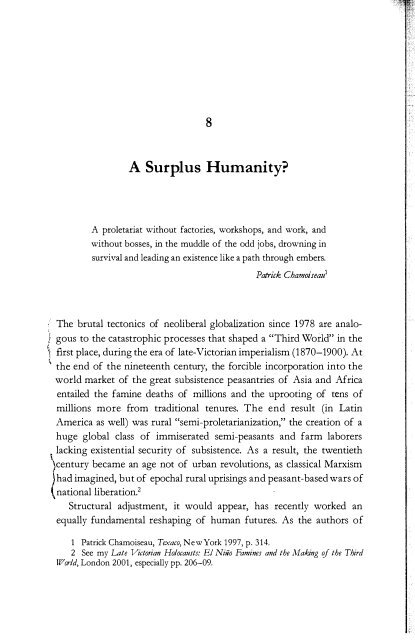Untitled - Rebel Studies Library
Untitled - Rebel Studies Library
Untitled - Rebel Studies Library
You also want an ePaper? Increase the reach of your titles
YUMPU automatically turns print PDFs into web optimized ePapers that Google loves.
I<br />
8<br />
A Surp! us Humanity?<br />
A proletariat without factories, workshops, and work, and<br />
without bosses, in the muddle of the odd jobs, drowning in<br />
survival and leading an existence like a path through embers.<br />
Patrick Chamoiseau1<br />
The brutal tectonics of neoliberal globalization since 1978 are analogous<br />
to the catastrophic processes that shaped a "Third World" in the<br />
first place, during the era of late-Victorian imperialism (1870-1900). At<br />
the end of the nineteenth century, the forcible incorporation into the<br />
world market of the great subsistence peasantries of Asia and Africa<br />
entailed the famine deaths of millions and the uprooting of tens of<br />
millions more from traditional tenures. The end result (in Latin<br />
America as well) was rural "semi-proletarianization," the creation of a<br />
huge global class of immiserated semi-peasants and farm laborers<br />
lacking existential security of subsistence. As a result, the twentieth<br />
)century became an age not of urban revolutions, as classical Marxism<br />
)had imagined, but of epochal rural uprisings and peasant-based wars of<br />
,<br />
national liberation.2<br />
Structural adjustment, it would appear, has recently worked an<br />
equally fundamental reshaping of human futures. As the authors of<br />
1 Patrick Chamoiseau, Texaco, New York 1997, p. 314.<br />
2 See my Late Victorian Holocausts: EI Nino Famines and the Making if the Third<br />
World, London 2001, especially pp. 206-09.<br />
A SURPLUS HUMANITY? 175<br />
The Challenge of Slums conclude: "Instead of being a focus for growth<br />
and prosperity, the cities have become a dumping ground for a surplus<br />
p9pulation working"in uns-killed, unprotected and low-wage informal<br />
sr;-Icmdustrlesand trade." "The rise of [ilils J informal sector," they<br />
dcl; l}irgiY;- a A1l:;:.t !l(r=,::." Se Brazilin<br />
sociologists call this process - analogous to the semi-proletarianization<br />
of landless peasants -passive proletarianization, involving the "dissolving<br />
of traditional forms of (re)production, which for the great majority of<br />
direct producers does not translate into a salaried position in the formal<br />
labor market."3<br />
This informal working class, without legal recognition or rights, has<br />
important historical antecedents. In modern European history!l1?les,<br />
even more than Dublin or London's East End, ",:, the eEl,ar oEan<br />
urban informal econgmy. In this "most shocking city of the nineteenth<br />
cenMY7''F;k--Sowden calls it in his brilliant studY,_ .. "chronic<br />
super-abundance of labour" survived by miracles of economic<br />
p C;--Jd; ;nd -the--c(;;; ;tant subdivision of subsistence niches. A<br />
structural dearth of formal jobs - permanent unemployment was estimated<br />
at 40 percent - was transformed into an overwhelming spectacle<br />
of informal competition. The street scene in Risorgimiento Naples<br />
(described below by Snowden) was a colorful but tragic anticipation of<br />
contemporary Lima or Kinshasa.<br />
It was characteristic of the ailing local economy that tens of thousands<br />
of people subsisted by peddling their wares amidst the filth of the city<br />
lanes and alleys. It was these impoverished entrepreneurs who gave<br />
Naples its feverish activity as a great emporium. These men and women<br />
were not workers, but "ragged-trousered capitalists" who filled a bewil<br />
dering variety of roles that baft1ed all efforts at quantification. A local<br />
authority termed them "micro-industrialists." The elite of the streets<br />
were newspaper vendors who practiced only one trade year-round and<br />
enjoyed a stable renumeration. The other huxters were "gypsy mer<br />
chants," authentic nomads of the marketplace who moved from activity<br />
to activity as opportunity dictated. There were sellers of vegetables,<br />
3 Challenge, pp. 40, 46; Thomas Mitschein, Henrique Miranda, and Mariceli<br />
Paraense, Urbanizarao Selva gem e Proletarizarao Passiva na AmazrYnia - 0 Caso de Belem,<br />
Belem 1989 (quoted in Browder and Godfrey, Rainforest Cities, p. 132).


